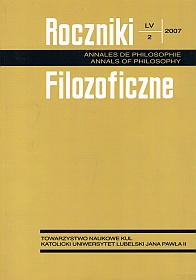What Do We Know about Good?
Abstract
The author claims that neither utility, nor perfection of any object can constitute the essence of good. Utility is the so-called relational attribute, therefore it is variable, and the objects perfect with regard to some respect can be used for bad purposes. Moral virtues also cannot express the essence of good, for their positive character is defined by the fact that they are good. With respect to the scholastic formulation ens et bonum convertuntur, the author says that existence itself, even of the objects perfect to a certain extent, is not good because in the concept of ens scholastics meant the being which is God, and the remaining objects are good inasmuch as they come from God. The scholastic tradition called God good because He created everything according to His good will. Here the author discusses the problem of the universal axiological illusion in the context of the absolute power of God (potestas absoluta). The so-called teleological definition of good (bonum est quod omnia appetunt) is thought to be insufficient, just like the definition that bonum est diffusivum sui. The objection to the first conception says that it understands “good” as an entirely static state of things. In this state all potentialities of an object gain their fulfilment. The second objection, in the spirit of Plotinus’ emanationism, is criticised because it sees good as giving of itself, in which the emanating factor does not participate in its creation. Drawing on some strains of scholastic philosophy and I. Kant, the author formulates a thesis that the essence of good is good will and that God can be called good only then when by creating the world He descends in it (descensio). The God of religion and Christian philosophy fulfils the conditions that determine the essence of good. This is confirmed by the Persons of the Holy Trinity who mutually give Themselves, the creation of finite persons, and the Incarnation. Addressing the problem of evil, the author claims that the only bad thing in the world is bad will. Accordingly, suffering and the so-called natural evil is not evil and the acts of bad will were allowed by God, for otherwise no finite person could know what bad will consists in.
References
Aersten J. A.: Transzendental; Transzendentalphilosophie, [w:] J. Ritter (red.), Historisches Wörterbuch der Philosophie, t.10, Basel: Schwabe & Co Verlag 1998, kol. 1358-1436.
Arystoteles: Etyka nikomachejska, tł. D. Gromska, Warszawa: PWN 1983.
Arystoteles: Metafizyka, tł. K. Leśniak, Warszawa: PWN 1983.
Hartmann N.: Ethik, Berlin: Walter de Gruyter & Co. 1949(3).
Hartmann N.: Platos Logik des Seins, Berlin: Walter de Gruyter & Co. 1965(2).
Hoffaman J., Rosenkranz G.: Omnipotence, [w:] Ph. L. Quinn, Ch. Taliaferro (red.), A Companion to Philosophy of Religion, Oxford: Blackwell 1997, s. 229-235.
Kant I.: Uzasadnienie metafizyki moralności, tł. M. Wartenberg, Warszawa: PWN 1984.
Pieper A.: Dobro, [w:] E. Martens, H. Schnödelbach (red.), Filozofia. Podstawowe pytania, tł. K. Krzemieniowa, Warszawa: Wiedza Powszechna 1995, s. 289-334.
Platon: Państwo, tł. W. Witwicki, Warszawa: Wydawnictwo Akme 1991.
Copyright (c) 2007 Roczniki Filozoficzne

This work is licensed under a Creative Commons Attribution-NonCommercial-NoDerivatives 4.0 International License.





